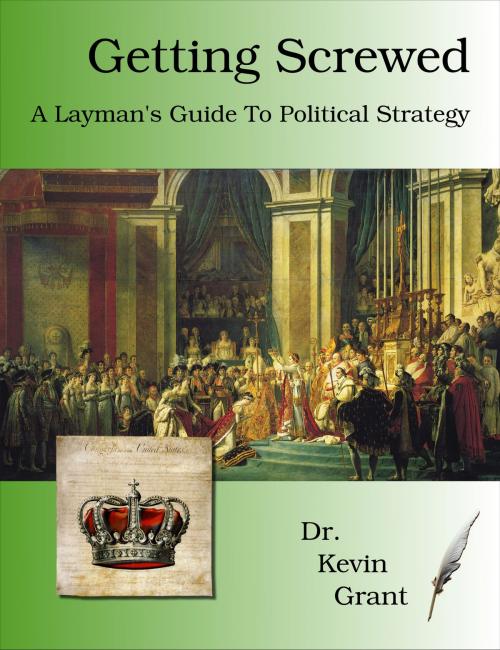Getting Screwed: A Layman's Guide to Political Strategy
Nonfiction, Social & Cultural Studies, Political Science, Government, Democracy| Author: | Kevin Grant | ISBN: | 9781311321114 |
| Publisher: | Kevin Grant | Publication: | September 27, 2015 |
| Imprint: | Smashwords Edition | Language: | English |
| Author: | Kevin Grant |
| ISBN: | 9781311321114 |
| Publisher: | Kevin Grant |
| Publication: | September 27, 2015 |
| Imprint: | Smashwords Edition |
| Language: | English |
If you're like most people then you live your life with no real understanding of the political game in which you're one of the pieces being played. But have no fear. As with any other game, there are explicit strategic and tactical considerations whose mastery will improve your understanding of the game. In Getting Screwed, Dr. Grant shows the readers how the game of politics is played. Among the many elements of political strategy discussed are:
• Know the Players: A good player will start each game by making a list of all of his opponents, making a special effort to spot any hidden opponents.
• Know the Game: Each player may be constrained by a different set of rules. A player who doesn't know what moves each of his opponents can make can't plan ahead.
• Know the Payoff: Each player may be competing for a different prize. A player who doesn't know what each of his opponents really wants to get out of the game can't anticipate their moves.
• Take the Long View: By taking the long view, a player can often make otherwise uncertain strategic decisions obvious.
• Have your Endgame Ready: A player who defeats his opponents before he's ready to take the prize for himself shouldn't be surprised if another player steps in and takes it first.
• Maintain Control: A player whose moves don't adequately constrain his opponents' responses will lose control of the game.
• Be Proactive: A player who's always responding to his opponents' moves, rather than making them respond to his, will always lose.
• Attack from Above: It's usually more effective for a player to bring pressure on his opponents down from above rather than up from below.
In Getting Screwed you'll also read detailed descriptions of some of the specific plays that politicians use to achieve their goals. For example:
• The Convenient Enemy: Politicians trying to acquire power might try to convince the voters that they need more power in order to protect the public from a convenient enemy.
• The Blue Ribbon Commission: A politician who has to make an unpopular decision might publicly offload his responsibility for it onto a blue ribbon commission.
• Attack the Questioner: A politician who's just been asked an embarrassing question might misdirect the audience's attention by attacking the questioner.
• The Straw Dog: A group of congressmen who want to decrease the popularity of the opposing party might find it a good time to sacrifice a straw dog.
• Toxic Regulations: A politician who wants to attack an entire industry might start by enacting some toxic regulations.
• The Push Poll: A politician who wants to shape public opinion on an issue without being too obvious about it might pay a polling firm to take a push poll.
• The Duck Bill: A congressman who needs to improve his own popularity after making a serious political mistake might propose a duck bill.
• The Washington Cut: Congressmen who want to increase spending while making it seem that they're doing exactly the opposite might make a Washington cut.
• Suspicious Subtext: A politician who wants to influence public opinion without being obvious about it might include some suspicious subtext in his next press release.
• The Hairshirt: A politician who wants to neutralize a rival might start by making him wear his own hairshirt.
In the final section Dr. Grant also explains the basics of operant conditioning, the method of psychological conditioning usually associated with B.F. Skinner, and how it can be used by the people to influence their politicians, rather than the other way around.
After finishing this book, readers will have a deeper understanding of the realities of political gamesmanship, and be able to recognize specific strategies and plays that their politicians are using against each other, and against the people. Getting Screwed is a must-have for people who want to better understand the nature of the political game in which they're being played as pieces.
If you're like most people then you live your life with no real understanding of the political game in which you're one of the pieces being played. But have no fear. As with any other game, there are explicit strategic and tactical considerations whose mastery will improve your understanding of the game. In Getting Screwed, Dr. Grant shows the readers how the game of politics is played. Among the many elements of political strategy discussed are:
• Know the Players: A good player will start each game by making a list of all of his opponents, making a special effort to spot any hidden opponents.
• Know the Game: Each player may be constrained by a different set of rules. A player who doesn't know what moves each of his opponents can make can't plan ahead.
• Know the Payoff: Each player may be competing for a different prize. A player who doesn't know what each of his opponents really wants to get out of the game can't anticipate their moves.
• Take the Long View: By taking the long view, a player can often make otherwise uncertain strategic decisions obvious.
• Have your Endgame Ready: A player who defeats his opponents before he's ready to take the prize for himself shouldn't be surprised if another player steps in and takes it first.
• Maintain Control: A player whose moves don't adequately constrain his opponents' responses will lose control of the game.
• Be Proactive: A player who's always responding to his opponents' moves, rather than making them respond to his, will always lose.
• Attack from Above: It's usually more effective for a player to bring pressure on his opponents down from above rather than up from below.
In Getting Screwed you'll also read detailed descriptions of some of the specific plays that politicians use to achieve their goals. For example:
• The Convenient Enemy: Politicians trying to acquire power might try to convince the voters that they need more power in order to protect the public from a convenient enemy.
• The Blue Ribbon Commission: A politician who has to make an unpopular decision might publicly offload his responsibility for it onto a blue ribbon commission.
• Attack the Questioner: A politician who's just been asked an embarrassing question might misdirect the audience's attention by attacking the questioner.
• The Straw Dog: A group of congressmen who want to decrease the popularity of the opposing party might find it a good time to sacrifice a straw dog.
• Toxic Regulations: A politician who wants to attack an entire industry might start by enacting some toxic regulations.
• The Push Poll: A politician who wants to shape public opinion on an issue without being too obvious about it might pay a polling firm to take a push poll.
• The Duck Bill: A congressman who needs to improve his own popularity after making a serious political mistake might propose a duck bill.
• The Washington Cut: Congressmen who want to increase spending while making it seem that they're doing exactly the opposite might make a Washington cut.
• Suspicious Subtext: A politician who wants to influence public opinion without being obvious about it might include some suspicious subtext in his next press release.
• The Hairshirt: A politician who wants to neutralize a rival might start by making him wear his own hairshirt.
In the final section Dr. Grant also explains the basics of operant conditioning, the method of psychological conditioning usually associated with B.F. Skinner, and how it can be used by the people to influence their politicians, rather than the other way around.
After finishing this book, readers will have a deeper understanding of the realities of political gamesmanship, and be able to recognize specific strategies and plays that their politicians are using against each other, and against the people. Getting Screwed is a must-have for people who want to better understand the nature of the political game in which they're being played as pieces.















